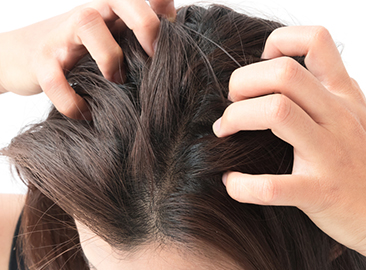An itchy scalp can be due to dry, flaking skin or oily dandruff, a fungal infection or a pesky creepy-crawler, an allergic reaction or even an auto-immune disease. Depending on the condition it can escalate from mere itching to inflamed rashes, damaged hair as well as balding. This is why it is important to understand the underlying cause and get timely treatment and relief.
Here are 7 common reasons that can cause an itchy scalp:
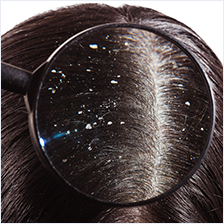
Did you know? Malassezia is a yeast that is commonly present on all scalp types. However, an overgrowth of the yeast-like fungus is what results in dandruff. The itching and flaking of the scalp is our body’s response to the over-presence of yeast. Generally, oily skin types are more affected, as Malassezia yeast flourishes in sebum. Dandruff, being one of the most common causes of an itchy scalp, has a number of treatment options available.
The Fix:
Over-the-counter anti-dandruff shampoos containing active ingredients like ketoconazole, selenium oxide, zinc pyrithione or coal tar help to control yeast and fight flakes. Home remedies like coconut oil, apple cider vinegar or aloe vera-gel can also get rid of dry, white flakes.
#2: Seborrheic Dermatitis (Seborrhea)
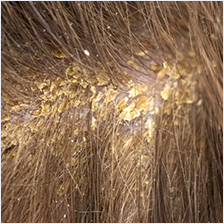
The Fix:
Severe cases can be tackled by prescription-strength steroid creams like hydrocortisone and fluocinolone, or medicated shampoos.
#3: Contact Dermatitis (Allergic Reactions)
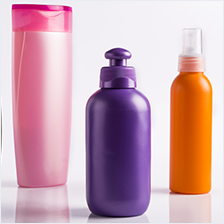
sensitizer present in certain products like shampoos, hair sprays and dyes, or your food. Some scalp types are more sensitive to known allergens or irritants like nickel, latex, fragrances, ingredients in make-up or paraphenylenediamine (PPD) in some hair dyes. Sensitizers are substances which your skin slowly becomes sensitive to over time, such as an ingredient in a shampoo you’ve been using for years. Foods, such as processed sugar, peanuts
and soy products can increase the occurrence of fungal infections and inflammation.
Our skin acts as a barrier against most allergens, irritants and sensitizers, but in case they get absorbed into our skin, our immune system triggers inflammation to isolate and kill the dangerous substance. This results in a red, itchy scalp.
Product build-up from hair-styling products, especially those that contain silicones, can also be the cause of an itchy, inflamed scalp. If not washed out properly, product build-up locks in allergens, irritants
and sensitizers close to the scalp. The layer of silicones can also obstruct your scalp’s natural shedding rate, leading to a flaky and dry scalp due to trapped, dead skin cells.
The Fix:
The good thing is that your condition is bound to clear up once you stop using the product that caused the allergic reaction. Specialized testing at the dermatologist can identify and help you avoid the allergen in future. A topical steroid can also be used.
#4: Dry Scalp
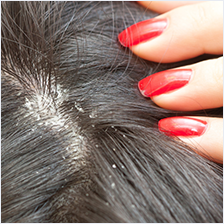
Dry skin, if not treated, can get inflamed, red and irritated. When the skin on your scalp is hydrated and healthy, it is better able to defend itself against invading irritants, allergens and sensitizers.
The Fix:
Try a deep conditioning massage or a hot oil treatment with coconut or olive oil to soothe and nourish your scalp. Switch to a gentle, moisturizing shampoo formulated for dry hair and avoid blow-drying or even products with ingredients that can dry out your hair. Increase your intake of vitamins B6 and B12, eat plenty of fruits, vegetables and whole-grains and supplement your diet with zinc, selenium and flaxseed oil. Hydrate yourself, since water is essential for healthy cell maintenance and growth.
#5: Psoriasis (Autoimmune Disease)
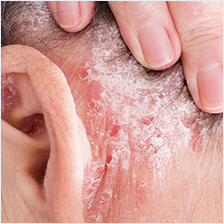
parts of the body, including the scalp. The scalp or skin erupts in red, raised scaly patches.
The Fix:
Over-the-counter medicated shampoos containing coal tar or salicylic acid can help control scalp psoriasis. If this doesn’t work, turn to dermatologist prescribed topical cortisone and stronger shampoos.
#6: Tinea Capitis (Ringworm)
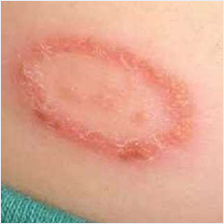
rubrum that penetrates deep into the hair follicle. The result: raised, round rashes on the skin, which is where the name comes from. The fungus can be present in the dead tissue of hair or nails and can spread due to minor scalp injuries, a sweaty scalp or unclean hair. Ringworm is highly contagious and if not treated at once, can lead to significant hair loss. When it occurs in the groin area, it is called a jock itch and between the toes, it is known as athlete’s foot. It can also spread in a man’s beard.
The Fix:
Simply using an over-the-counter anti-fungal solution will not treat Tinea Capitis of the scalp. An oral anti-fungal medication is required since the fungus is present deep in the hair follicles.
#7: Lice
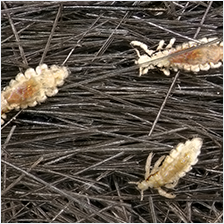
The Fix:
You can treat head lice with over-the-counter shampoos containing insecticides such as pyrethrin or permethrin which kill lice by directly attacking the nervous system. Head lice can be removed with a special comb using the nitpicking and combing technique. You can also opt for permethrin lotion 1% or natural remedies like olive oil.
Although the symptoms of an itchy scalp look quite similar, involving clusters of dead skin and white or yellow flakes, redness and irritation, their underlying causes could be different, requiring individual and specific treatments. It’s important to consult a dermatologist for the right relief and medication before the condition becomes more severe. Sign up on www.skinandhairacademy.in to contact your nearest dermatologist now.

